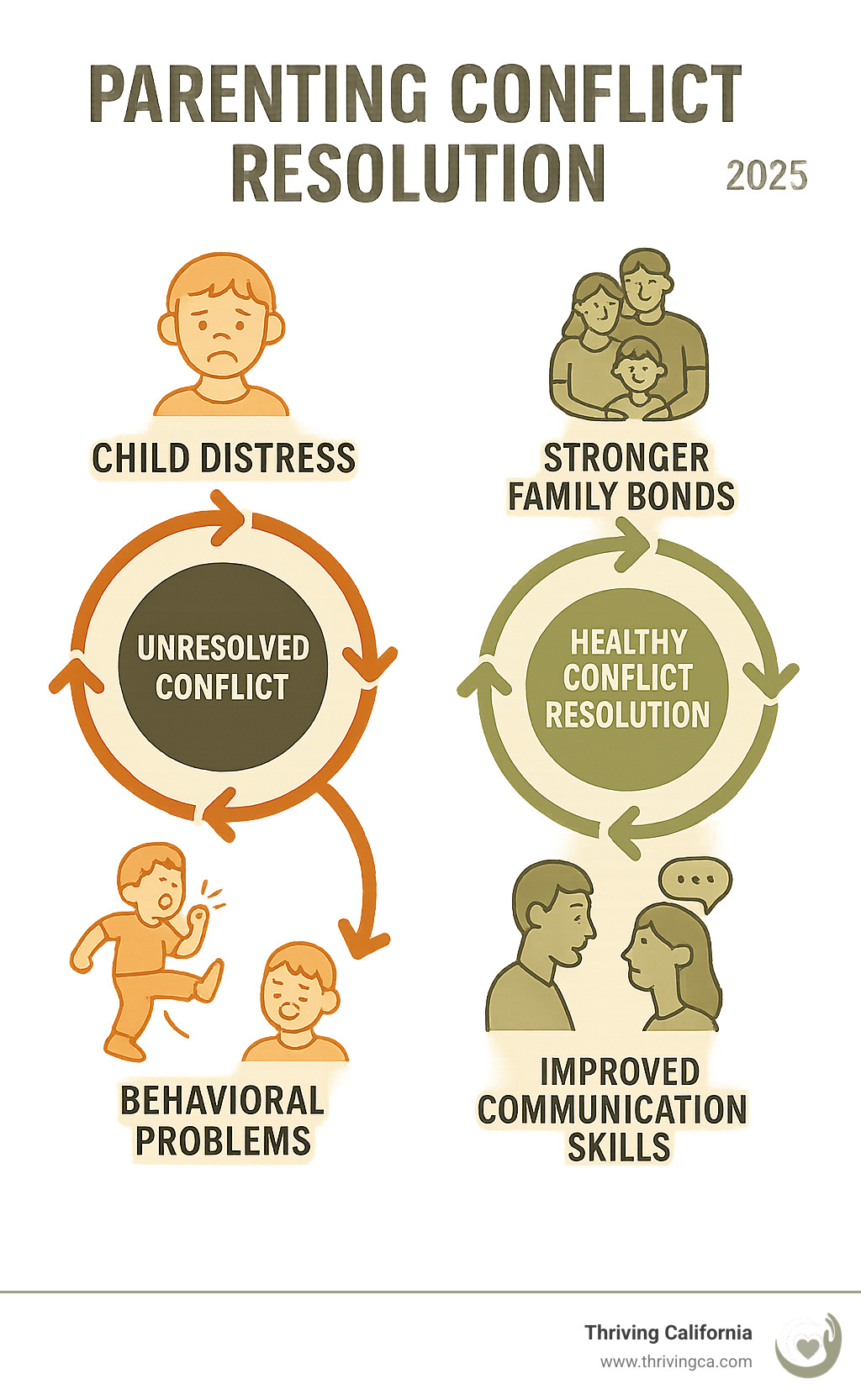Parenting Conflict Resolution: Building Peaceful Partnerships Through Connection and Understanding

Raising children brings immense joy, but it also introduces new challenges that can create tension between parents. Whether you're navigating different parenting styles, managing stress from sleepless nights, or working through disagreements about discipline, parenting conflicts are a natural part of family life. At Thriving California, our group practice supports parents and families throughout California in transforming these challenging moments into opportunities for deeper connection and stronger relationships.
Understanding Parenting Conflict Through a Relational Lens
Conflict resolution between parents isn't just about finding quick fixes—it's about understanding the deeper dynamics that influence how we communicate and connect. When parents in Napa, Lafayette, Thousand Oaks, and throughout California learn to resolve conflicts constructively, children witness powerful examples of healthy communication, empathy, and relationship resilience.
Many parents struggle with managing conflict, especially when different parenting styles come into play. Your approach to parenting might reflect your own childhood experiences, while your co-parent brings their unique perspective shaped by their family of origin. These differences don't have to create division—they can enrich your family life when approached with curiosity and mutual respect.
The reality is that marital conflict and parenting disagreements affect the entire family system. Children, especially younger children ages 0-3, are remarkably attuned to the emotional atmosphere of their homes. When parents focus on positive conflict resolution, children learn that relationships can weather disagreements while maintaining fundamental safety and connection.

The Hidden Impact of Unresolved Parental Conflict on Children
When conflicts arise and remain unaddressed, the negative impact on children can be profound and lasting. Unresolved conflict between parents doesn't just affect the adult relationship—it ripples through the entire family, influencing the parent-child relationship and shaping how children understand relationships throughout their lives.
Children experiencing ongoing parental conflict often develop various coping strategies that, while protective in the moment, can create lasting challenges. Some children become hypervigilant, constantly monitoring for signs of tension between their parents. Others withdraw emotionally or develop physical symptoms like stomachaches or sleep disturbances. These responses reflect the child's attempt to manage strong feelings in an environment that feels unpredictable.
The negative effects of unresolved parental conflict extend beyond immediate behavioral concerns. When parents don't actively work to resolve their differences, children may:
- Internalize blame, believing they're responsible for their parents' anger
- Struggle with emotional regulation and managing their own conflicts
- Experience difficulties with school adjustment and peer relationships
- Develop anxiety about relationships and commitment in their adult lives
- Have trouble trusting that relationships can be safe and stable
Most parents don't realize how much their conflict management style influences their children's development. Even when disagreements happen behind closed doors, children sense the tension and may feel caught between loyalties to both parents.
Protecting Children Through Conscious Conflict Resolution
To protect children from the harmful effects of parental discord, parents must develop conflict resolution skills that prioritize the child's wellbeing. This means learning to manage stress effectively, regulate emotional arousal during disagreements, and maintain focus on finding solutions rather than winning arguments.
Taking time out during heated moments isn't a sign of weakness—it's an essential part of healthy conflict management. When you notice increased stress or strong feelings arising, pausing the conversation allows both parents to regain composure and approach the issue with clearer minds. This self-care practice models emotional regulation for your children and prevents conflicts from escalating into damaging exchanges.
Adults have the responsibility to create a stable emotional environment, even when they disagree. This means learning to openly discuss differences without involving children, maintaining a united front on parenting decisions, and demonstrating that love and respect can coexist with disagreement. When parents focus on common ground and shared values, even significant differences become manageable.
Developing Communication Skills That Strengthen Your Relationship
Effective communication forms the foundation of successful conflict resolution. Many parents find that improving their communication skills not only helps resolve immediate disagreements but also strengthens their overall relationship and family bonds.
True listening involves more than waiting for your turn to speak. It requires setting aside your own perspective temporarily to fully understand your co-parent's experience. When you listen with genuine curiosity, you might discover that beneath a surface disagreement about bedtime routines lies a deeper concern about your child's wellbeing or your partner's need to feel heard and valued.
Using your own words to express feelings rather than making accusations creates space for dialogue. For example, instead of saying "You never support my parenting decisions," try expressing your experience: "When my parenting choices are questioned in front of our child, I feel undermined and disconnected from you." This approach to communication helps both parents feel heard while working toward practical solutions.

Navigating Different Parenting Styles with Respect
Every parent brings their unique perspective to raising children, influenced by family psychology, cultural background, and personal values. Different parenting styles don't have to be a source of conflict—they can offer complementary strengths when approached collaboratively.
Rather than viewing differences as problems to solve, consider how various parenting styles might benefit your children. One parent's emphasis on structure might balance the other's focus on flexibility. These differences become problematic only when parents fail to openly discuss their approaches or when they undermine each other's authority.
The key to managing different parenting styles lies in:
- Identifying shared values and common ground beneath surface disagreements
- Respecting that the other parent has your child's best interests at heart
- Finding creative ways to blend approaches rather than forcing uniformity
- Presenting a united front to children, even while negotiating differences privately
- Recognizing that families thrive with some flexibility in approaches
Remember, children grow and develop through exposure to different but complementary parenting approaches, as long as both parents maintain mutual respect and avoid undermining each other.
Building Co-Parenting Skills for Lasting Family Harmony
Strong co-parenting requires intentional effort and ongoing commitment to working together for your children's benefit. Whether you're navigating everyday decisions or major life changes, developing robust co-parenting skills helps create stability and security for your entire family.
Co-parenting effectively means:
- Maintaining consistent communication about your children's needs and development
- Coordinating approaches to discipline and boundaries
- Supporting each other through challenging parenting moments
- Sharing responsibilities in ways that feel fair and sustainable
- Celebrating successes and milestones together
Many parents find that improving their co-parenting relationship has positive effects that extend throughout family life. When parents work as a team, children feel more secure, family members experience less stress, and the home environment becomes more peaceful and predictable.

Problem-Solving Strategies That Protect Children and Strengthen Families
Effective problem-solving in parenting requires moving beyond immediate emotional reactions to focus on finding solutions that work for everyone. This collaborative approach to resolving conflict demonstrates to children that challenges can be overcome through patience, creativity, and mutual respect.
When disagreements arise, try this problem-solving framework:
- Define the issue clearly without blame or judgment
- Explore each parent's underlying concerns and needs
- Brainstorm multiple potential solutions together
- Evaluate options based on your family's values and your child's wellbeing
- Agree on a trial period for your chosen approach
- Review and adjust as needed
This structured approach to problem-solving helps parents move from conflict to collaboration, teaching children valuable skills they'll use throughout their lives.
Supporting Mental Health During Parenting Challenges
Parenting conflicts can take a serious toll on mental health, creating a cycle where increased stress leads to more frequent disagreements. Breaking this cycle requires attention to both individual and relationship wellbeing.
Self-care isn't selfish—it's an essential part of maintaining the emotional resources needed for patient, effective parenting and partnership. When parents prioritize their mental health through adequate rest, exercise, social connection, and personal interests, they're better equipped to handle conflicts constructively.
Developing healthy coping strategies helps parents manage the inevitable stresses of raising children. This might include:
- Regular mindfulness or meditation practice
- Physical exercise to release tension and improve mood
- Journaling to process emotions and gain clarity
- Connecting with supportive family members or friends
- Engaging in creative or recreational activities
- Seeking support from mental health professionals when needed
When both parents actively work on their individual wellbeing, the entire family benefits from increased emotional stability and resilience.
Recognizing When to Seek Support
While many families successfully navigate parenting conflicts independently, there's no shame in seeking support when challenges feel overwhelming. Professional help can provide new perspectives, teach effective conflict management strategies, and help families break free from destructive patterns.
Consider reaching out for therapeutic support if you notice:
- Conflicts escalating despite efforts to communicate differently
- The same disagreements recurring without resolution
- Negative effects on your children's behavior or emotional wellbeing
- Difficulty maintaining connection after arguments
- Past traumas interfering with present-day parenting
- Feeling stuck in patterns from your own family of origin
Our group practice specializes in helping parents understand and transform the deeper patterns beneath surface conflicts. Through our therapeutic approaches, we help families build stronger foundations for long-term harmony and connection.
Special Considerations for Early Parenthood
Parents of younger children face unique challenges that can intensify conflicts. The transition to parenthood, particularly with children ages 0-3, brings sleep deprivation, identity shifts, and overwhelming responsibility that can strain even strong relationships.
During this vulnerable time, parents need to function as each other's secure base—maintaining fundamental safety and connection even while navigating disagreements. This is especially important for parents dealing with pregnancy anxiety, birth trauma, or postpartum challenges.
For families where birth trauma has occurred, the need for sensitive, attuned support becomes even more critical. Birth trauma can affect how parents bond with their babies, relate to each other, and trust their own instincts. Our specialized approach using somatic resourcing and bilateral stimulation helps parents process these experiences while strengthening their important relationships.

Preventing Escalation: When Conflicts Arise
Understanding how to prevent conflicts from escalating protects children from exposure to harmful parental discord. When you feel anger rising or notice familiar patterns beginning, having strategies in place can make the difference between a productive discussion and a damaging argument.
Early warning signs that a conflict might escalate include:
- Physical tension or emotional arousal increasing
- Voices getting louder or more aggressive
- Bringing up past grievances unrelated to the current issue
- Using absolute language like "always" or "never"
- Feeling overwhelmed or flooded with strong feelings
When you notice these signs, taking time out allows both parents to regulate their emotions before continuing the conversation. This pause isn't about avoiding the issue—it's about ensuring you can address it constructively.
Creating Family Foundations for Long-Term Success
Building strong family foundations requires ongoing attention to both individual and relationship health. Regular check-ins about your partnership—separate from logistics about childcare—help prevent small resentments from becoming major rifts.
As children grow and family dynamics evolve, your approach to conflict resolution will need to adapt. What works for managing disagreements about infant sleep may need adjustment when navigating toddler tantrums or preschool transitions. This ongoing nature of the work offers continuous opportunities for growth and deeper connection.
The goal isn't to eliminate all disagreements but to develop confidence that your partnership can weather differences while maintaining fundamental safety and connection. When families focus on building these skills together, they create an environment where all family members can thrive.
The Importance of Modeling Healthy Conflict Resolution
Children learn more from what they observe than from what they're told. When parents model respectful disagreement and collaborative problem-solving, children internalize these patterns as normal and achievable. This modeling becomes part of their internal template for how relationships work.
Even when conflicts happen in front of children (as they sometimes will), the repair process offers powerful learning opportunities. A genuine apology, followed by visible reconnection between parents, teaches children that relationships can survive rupture and emerge stronger.
This doesn't mean parents need to be perfect. In fact, showing children that adults can make mistakes, take responsibility, and work to repair relationships may be more valuable than never showing any conflict at all.

Understanding Triggers and Breaking Cycles
We all carry emotional triggers from our own experiences—specific situations, tones, or dynamics that provoke disproportionate responses. These triggers often connect to earlier experiences, sometimes from our own childhoods. Understanding your triggers helps create more choice in how you respond to parenting conflicts.
Many parents struggle with patterns inherited from their families of origin. Perhaps you grew up in a home where conflict meant silence for days, or where disagreements erupted into shouting matches. Recognizing these inherited patterns is the first step toward creating something different for your own children.
Breaking these cycles requires patience and self-compassion. Deeply ingrained habits take time to shift, but with consistent effort and often professional support, parents can create new, healthier patterns for their families.
Beginning Your Journey with Thriving California
At Thriving California, our doctoral-level clinicians understand that parenting conflicts often touch deeper themes of identity, belonging, and connection. We recognize that beneath surface disagreements about parenting lie complex relational dynamics shaped by each parent's history and experiences.
Whether you're working through birth trauma, navigating new parenting challenges, or seeking to strengthen your partnership through early parenthood, we provide a space where all aspects of your experience can be explored and understood. Our depth-oriented approach means we're interested not just in helping you resolve immediate conflicts but in fostering genuine transformation that benefits your entire family.
We work with parents and families throughout California, with offices in Napa, Lafayette, and Thousand Oaks, as well as telehealth options across the state. Our intake process begins with a free 20-minute consultation where we can discuss your specific needs and determine if our approach aligns with what you're seeking.
For parents ready to begin this important work, we invite you to reach out and schedule your consultation. Together, we can explore how to transform parenting conflicts from sources of disconnection into opportunities for deeper understanding and stronger family bonds. The investment you make in developing these conflict resolution skills today creates lasting positive effects for your family's future.
